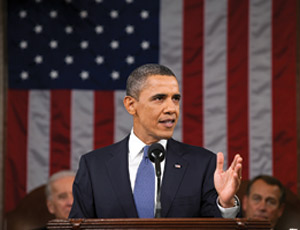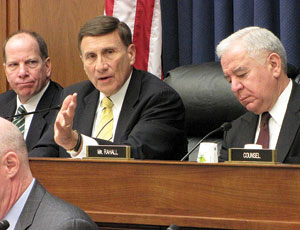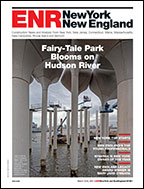President Obama’s call in his State of the Union address for more funding for highways, transit and other infrastructure has launched what should be a rugged fight with congressional Republicans this year over public-works spending. Obama and his Democratic allies in Congress will push to


boost infrastructure funds, but the GOP, seeking to capitalize on its new House majority, has its budget knives out. The outcome will shape the federal public- works sector, one of the few recent bright spots for a construction industry still struggling to emerge from a severe recessionary slump.
Obama’s remarks, delivered on Jan. 25 before a joint session of Congress, were the strongest pro-infrastructure comments in any President’s State of the Union speech in recent memory.
“Our infrastructure used to be the best, but our lead has slipped,” he said. “We have to do better.” Public-works advocates praised Obama, but those supporters already were wary of the obstacles presented by Republicans. Jay Hansen, National Asphalt Pavement Association vice president for legislative and regulatory affairs, says, “The reaction from the Republicans has been they’re against anything that’s going to require more money [being deposited] into the Highway Trust Fund.”
Beyond highways and transit, Obama again called for high-speed passenger rail around the country, aiming to give 80% of the U.S. access to fast trains in 25 years. He also said he wants to put more money into clean-energy technology, seeking to have 80% of the nation’s electricity generated from such sources by 2035.
Obama’s rhetorical skills were in full flourish, but his staff failed to specify what would be in the infrastructure plan. Obama is expected to provide details in mid-February, when he releases his 2012 budget plan and a long-awaited proposal for a new multiyear transportation bill. The last major highway-transit statute lapsed 15 months ago.
In background information accompanying the speech, the White House did say the February proposal will be a “comprehensive, six-year plan to leverage our resources to repair our crumbling roads, bridges and transit.”
It added that the blueprint “will feature up-front investments” and an infrastructure bank, which the White House said would use federal funds to leverage private financing for “projects of national and regional significance.”
The President and his advisers did not say how large the plan or its components will be. But when Obama previewed the ideas on Sept. 6, the White House pegged the up-front infusion at $50 billion.
In a nod to critics who have sought to reshape current highway and transit programs, Obama said of his upcoming proposal, “We will make sure this is fully paid for, attract private investment and pick projects based on what’s best for the economy, not politicians.”
Jack Basso, American Association of State Highway and Transportation Officials’ director for program finance and management, says Obama is seeking a consensus. The President “seemed to be … in a very honest way reaching out and saying, ‘Look, these are priorities. … We’ve got to work together.’ ”
Basso says, “I’m trying to figure out, Where is that money coming from?”
Senate Environment and Public Works Committee Chair, Barbara Boxer (D-Calif.), will be working on a new transportation bill and is likely to support Obama’s concepts.
New Committee Leader
But in the House, arguments about funding will involve the Republicans’ point man for the highway-transit bill, new Transportation and Infrastructure Committee Chairman John Mica (R-Fla.). He has his own ideas about how the bill should be shaped and financed.
On Jan. 26, at the first meeting of his committee in the new Congress, Mica told panel members, “We’ve got to do a major [surface] transportation bill.” To gather ideas, he plans “a cross-country tour,” from Feb. 17 to 25. He says he wants to go to at least a dozen states.
Although Mica says “I’m going to be as flexible as a Barbie doll” in drafting the bill, he clearly has an outline in mind.
Regarding Obama’s proposed up-front infusion for the transportation bill, Mica says, “If it’s new money, it’s off the table.” That would rule out even a penny hike in the 18.4¢-per-gallon federal gasoline tax, the Highway Trust Fund’s largest revenue source. Brian Deery, senior director of the Associated General Contractors’ highway and transportation division, says Mica is “not going to propose or even support raising the gas tax” and, instead, is trying to find “the unspent money here and there and everywhere.”
That conjures an image of searching under federal seat cushions. After the committee meeting, Mica identified possible sources of money, including unspent American Recovery and Reinvestment Act funds as well as money set aside in older transportation statutes for still-unbuilt projects that Mica says “have gone by the wayside.”
Under his plan, Mica wants to include “innovative financing” provisions, tapping public-private partnerships and the bond market. He says he will look at an infrastructure bank and expanding the existing aid under the Transportation Infrastructure Finance and Innovation Act, including loans and loan guarantees.
Mica wants to include provisions to bring about a “dramatic expediting” of the project-approval process, such as eliminating regulations. The goal is to shave project timetables and reduce costs.
NAPA’s Hansen says while Democrats are “talking about investments for the future,” Republicans are advocating “cutting spending to grow the economy.” He adds, “And I just don’t see where the two are going to meet up.”




Post a comment to this article
Report Abusive Comment